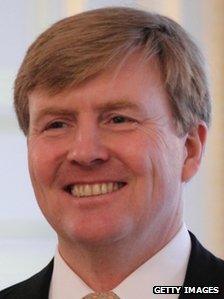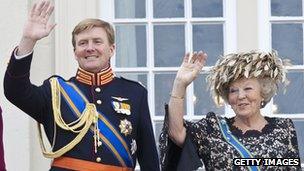Profile: Willem-Alexander, King of the Netherlands
- Published

Prince Willem-Alexander believes the monarchy must move with society
Prince Willem-Alexander has become king of the Netherlands following the abdication of his 75-year-old mother.
Born on 27 April 1967 as the first child of Queen Beatrix and the late Prince Claus, the Prince of Orange is the first male head of state of the Netherlands since 1890.
His kingdom spans two continents and is made up of four countries: Aruba, Curacao and Sint Maarten in the Caribbean as well as the Netherlands in Europe.
The prince has said that as king he wants to strike a balance between upholding tradition and embracing change, which could include accepting a smaller role in Dutch politics.
No 'protocol fetishist'
Willem-Alexander's title, Prince of Orange, derives from the former Principality of Orange in southern France.
It was held by William of Orange (1533-1584), who led the revolt against the Spanish that resulted in the creation of the Netherlands.
But the prince has indicated that he attaches little importance to titles. Instead of calling him "Majesty" once he is king, he recently said that people "can address me the way they want".
"I'm not a protocol fetishist," he told Dutch TV. "It's more important to me that people feel at ease when I'm with them."
'Prince Pils'
Prince Willem-Alexander attended schools in the Netherlands but finished his secondary education at the Atlantic College in Wales.
He went on to study history at the University of Leiden, where his taste for partying earned him the nickname "Prins Pils" .
But he insists that he is now ready for his new role after a "very good, long time of preparation", which has enabled him to get to know his kingdom "in and out".
He is married to Argentine-born Princess Maxima, with whom he has three daughters.
The marriage in 2002 was controversial because the bride's father served as agriculture minister in the Argentine military dictatorship from 1979 to 1981.
The prince's official biography, external lists water management, infrastructure, information and communications technology, sport, defence and aviation as special interests.
According to media reports, his sporting activities include tennis, running, skiing, sailing, golf, horse riding, skating and diving. In 1992, he took part in the New York marathon.
'Error of judgment'

Queen Beatrix has said it is time for the throne to be held by "a new generation"
The royal couple's investment in a holiday resort project in Mozambique in 2008 turned sour amidst reports of corruption and complaints by locals.
Eventually they decided to pull out and sold their holiday home in January 2012.
On Dutch TV, the prince admitted to an "error of judgment" in trying to emphasize the positive aspects of the project for too long.
"People make mistakes. I will make mistakes in the future, too... I think we have learnt a lot from this and that it has also been part of the training in our preparation for kinghood," he said.
'Changing role'
In his TV interview, Prince Willem-Alexander said he wanted to be a king who "adheres to tradition" and who can also "unite, represent and encourage society".
But he added that the only thing that is constant about a monarchy is that "it always moves with society".
The prince made it clear that it would be acceptable to him if MPs decided that the monarchy should become purely ceremonial. "Parliament is the highest body in the Netherlands," he said.
Asked what he would like to be remembered for at the end of his reign, he said that "the most important thing is for the king and the monarchy to pick up their changing role well and to still be able to be there as a symbol of continuity and unity".
The Dutch affairs editor of the weekly magazine Elsevier, Gertjan van Schoonhoven, said the prince's remarks were intended to show that he and his wife "know their place".
They royal couple can draw comfort from a recent opinion poll which suggests that for three quarters of the Dutch there is no question of abolishing the monarchy. Two thirds said they had confidence in King Willem-Alexander, while only 12% said they had confidence in politicians.
On TV, the prince said he had no problem with protests against the monarchy, including on the day of his investiture. "Protest is always allowed," he said.
BBC Monitoring, external reports and analyses news from TV, radio, web and print media around the world. For more reports from BBC Monitoring, click here. You can follow BBC Monitoring on Twitter, external and Facebook, external.